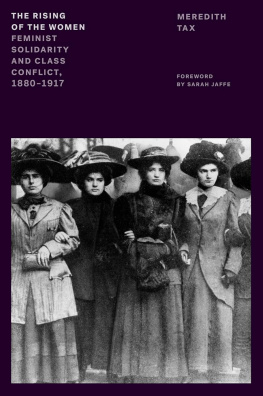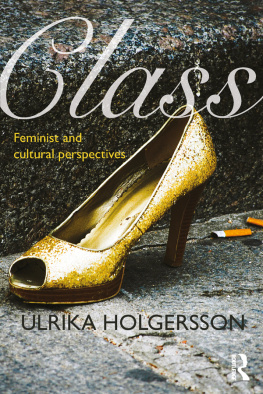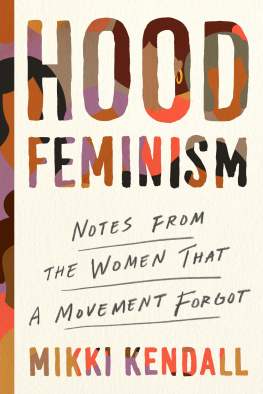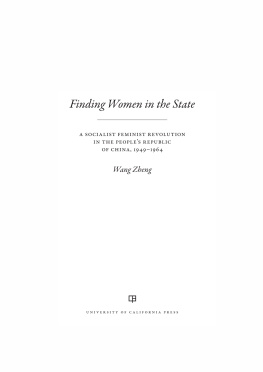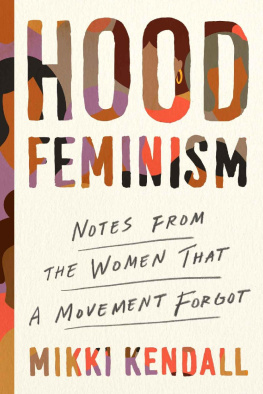Meredith Tax - The Rising of the Women: Feminist Solidarity and Class Conflict, 1880-1917
Here you can read online Meredith Tax - The Rising of the Women: Feminist Solidarity and Class Conflict, 1880-1917 full text of the book (entire story) in english for free. Download pdf and epub, get meaning, cover and reviews about this ebook. year: 2022, publisher: Verso Books, genre: Politics. Description of the work, (preface) as well as reviews are available. Best literature library LitArk.com created for fans of good reading and offers a wide selection of genres:
Romance novel
Science fiction
Adventure
Detective
Science
History
Home and family
Prose
Art
Politics
Computer
Non-fiction
Religion
Business
Children
Humor
Choose a favorite category and find really read worthwhile books. Enjoy immersion in the world of imagination, feel the emotions of the characters or learn something new for yourself, make an fascinating discovery.
- Book:The Rising of the Women: Feminist Solidarity and Class Conflict, 1880-1917
- Author:
- Publisher:Verso Books
- Genre:
- Year:2022
- Rating:5 / 5
- Favourites:Add to favourites
- Your mark:
- 100
- 1
- 2
- 3
- 4
- 5
The Rising of the Women: Feminist Solidarity and Class Conflict, 1880-1917: summary, description and annotation
We offer to read an annotation, description, summary or preface (depends on what the author of the book "The Rising of the Women: Feminist Solidarity and Class Conflict, 1880-1917" wrote himself). If you haven't found the necessary information about the book — write in the comments, we will try to find it.
Meredith Tax: author's other books
Who wrote The Rising of the Women: Feminist Solidarity and Class Conflict, 1880-1917? Find out the surname, the name of the author of the book and a list of all author's works by series.
The Rising of the Women: Feminist Solidarity and Class Conflict, 1880-1917 — read online for free the complete book (whole text) full work
Below is the text of the book, divided by pages. System saving the place of the last page read, allows you to conveniently read the book "The Rising of the Women: Feminist Solidarity and Class Conflict, 1880-1917" online for free, without having to search again every time where you left off. Put a bookmark, and you can go to the page where you finished reading at any time.
Font size:
Interval:
Bookmark:

The Rising of the Women
The Rising
of the Women
Feminist Solidarity and
Class Conflict, 18801917
MEREDITH TAX

This edition published by Verso 2022
First published by Monthly Review Press 1980
Meredith Tax 1980, 2001, 2022
Foreword Sarah Jaffe 2022
All rights reserved
The moral rights of the authors have been asserted
1 3 5 7 9 10 8 6 4 2
Verso
UK: 6 Meard Street, London W1F 0EG
US: 20 Jay Street, Suite 1010, Brooklyn, NY 11201
versobooks.com
Verso is the imprint of New Left Books
ISBN-13: 978-1-83976-574-2
ISBN-13: 978-1-83976-576-6 (US EBK)
ISBN-13: 978-1-83976-575-9 (UK EBK)
British Library Cataloguing in Publication Data
A catalogue record for this book is available from the British Library
Library of Congress Cataloging-in-Publication Data
The Library of Congress catalogued the 1980 edition of The Rising of the Women:
Library of Congress Cataloging-in-Publication Data Tax, Meredith.
The rising of the women : feminist solidarity and class conflict, 1880-1917 / Meredith Tax.
p. cm.
Originally published: New York: Monthly Review Press, 1980.
Includes bibliographical references and index. ISBN 0-252-07007-0 (pbk. : alk. paper)
1. Women labor union members-United States History. 2. Feminism-United States-History. 3. Women and socialism-United States-History.
I. Title.
HD6079.2.U5T392001
331.4780973-dc212001027439
Printed and bound by CPI Group (UK) Ltd, Croydon, CR0 4YY
Contents
Todays left, and particularly todays feminist movement, is all too often stumbling from crisis to crisis, reactive, frustrated, and lost.
It is also bigger than it has been in decades, rebuilding old organizations and starting new ones, jostling for position in a world where those crises are themselves the norm. In the wake of the 2008 financial collapse and now the ongoing Covid-19 pandemic, there are new opportunities to remake the relations of power that just twenty years ago seemed immutable.
When we are cut off from our historyas we so often are in a neoliberal world obsessed with the eternal nowwe find ourselves doomed to rehash the same debates, the same fights, the same betrayals. We cannot learn from our history when we only know its barest contours, or when we only learn it as the glorious tale of a hero or heroine who made victory possible. The left is no less prone to Great Man histories than anyone else, even as it professes to care about collective action.
And so Meredith Taxs history of the collective action of women in labor in America at the turn of the 20th century, and the repeated attempts to form a united front of women to fight for feminist goals, was necessary when it was first written, and it is even more necessary now. Todays rising U.S. left confronts many of the same questions that workers did in the Gilded Age, before the New Deal and the rise of industrial unionism, when worker organization was fractious, police and even military violence met any who tried to disrupt the process of capital accumulation, many workers made ends meet with piece-work (or as we might call it today, gig work) in the home, and employers exploited migrants and Black workers to keep wages low, stoking racism to maintain division.
Of course, things are different now, too.
Few today who take labor seriously would say out loud that women are unorganizable or dont need unions. Yet too often the labor movement even in 2021 fetishizes structures and tactics built for a mid-century working world where a man goes to work and has a wife at home, and mourns the loss of traditionally masculine jobs while giving feminized industries short shrift. Too often unions turn to electoral politics to win gains that seem impossible to win on the shop floor, only to be betrayed by the politicians that labor has backed. And even in todays organizations there is a tendency to decry identity politics, which in practice tends to mean how dare you get your race and gender in my nice neat class war.
Except as this book shows, there is nothing neat about class war. And to win, working people will have to learn to form coalitions, discern the difference between allies and comrades, and take seriously demands that come from the home and community as well as the workplace.
The Rising of the Women is a book meant for political practice, a book designed to take lessons from history to help todays organizers and troublemakers formulate strategies for their work. By reading the true stories of what happened during famous strikes like the Bread and Roses strike in Lawrence, Massachusetts in 1912 and the Uprising of the 30,000 in New York in 1909, as well as of lesser-known struggles, Tax has given todays organizers a particular gift: she shows us how much there is to be learned from losses, as much as from a heroic win.
* *
At the heart of the book are socialist women, who, Tax writes, understood themselves as the human links between the feminist movement, the labor movement, and the socialist movement. They understood the relationship between these movements as dialectical, and within their livestheir immigrant, radical, working-class livesthey brought together, sometimes messily, issues that they were often told were opposed. For them, Tax notes, labor history comes attached to community history and family history and the history of reproduction. It involves not only class consciousness and the consciousness of national oppression, but also sex consciousness.
There were high points for these women, when all of the struggles seemed to coalesce, when an understanding of the problems of the class meant understanding that class struggle could occur in the street and the home and the church and the community organization as well as the shop floor, that the bread riot is a proletarian battle too and that fighting eviction is a feminist goal. And there were low points, when labor leaders (particularly within the American Federation of Labor) treated feminism as a bourgeois plot, or bourgeois allies tried to corral working womens uprisings into the fight for the vote, trying to solve every problem with protective legislation and support for lesser-evil candidates rather than more immediate action.
These women worked in fledgling labor organizations, from the Knights of Labor to the Industrial Workers of the World, and of course the AFL. Sometimes they organized locals separately from the men and sometimes they were absorbed into the broader union; they also formed cross-class but (at least in theory) prolabor organizations like the Illinois Womens Alliance and the Womens Trade Union League.
This is a book about collective struggles rather than individual heroes, but nonetheless Tax brings to life in these pages so many vibrant characters who are fierce and funny, righteous and burned out, and above all real people who experienced wins and losses as material changes to their lives, not just numbers on a scoreboard. You will meet Chicago radical Lizzie Swank; the AFLs first general organizer for women Mary Kenney; Leonora OReilly, the soul of the WTUL; IWW firebrand Elizabeth Gurley Flynn; Clara Lemlich, hero of the shirtwaist strike; IWW domestic worker organizer Jane Street; and rank and file textile striker Annie Welsenbach of Lawrence.
Gilded Age workplace demands often centered on the need for freedom from work, pointing out that the drudgery most paid jobs consisted of was hardly liberatory. As Chicago garment worker Anna Rudnitsky wrote in the WTULs magazine, First we must get a living-wage and then we must get a shorter work-day, and many many more girls must do some thinking. It isnt that they do not want to think, but they are too tired to think and that is the best thing in the Union, it makes us think. It makes us stronger and it makes us happier and it makes us more interested in life and to be more interested in life is oh, a thousand times better than to be so dead that one never sees anything but work all day and not enough money to live on. That is terrible, that is like death.
Next pageFont size:
Interval:
Bookmark:
Similar books «The Rising of the Women: Feminist Solidarity and Class Conflict, 1880-1917»
Look at similar books to The Rising of the Women: Feminist Solidarity and Class Conflict, 1880-1917. We have selected literature similar in name and meaning in the hope of providing readers with more options to find new, interesting, not yet read works.
Discussion, reviews of the book The Rising of the Women: Feminist Solidarity and Class Conflict, 1880-1917 and just readers' own opinions. Leave your comments, write what you think about the work, its meaning or the main characters. Specify what exactly you liked and what you didn't like, and why you think so.

